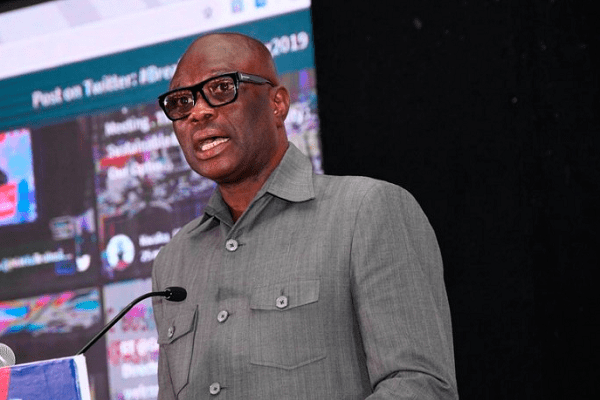Two of Ghana’s most influential business associations; the Ghana Union of Traders Association (GUTA) and the Food and Beverages Association of Ghana (FABAG), have issued strong warnings to the government over the country’s escalating utility tariffs.
They argue that the continuous hikes in electricity and water costs are severely undermining the survival of businesses, particularly small and medium-sized enterprises (SMEs), while crippling Ghana’s competitiveness under the African Continental Free Trade Area (AfCFTA).
The Ghana Union of Traders Association has expressed deep frustration that Ghana’s high cost of utilities is inflating production and operational expenses. This, according to GUTA, is making locally produced goods less competitive in the regional market, discouraging both local and foreign investors.
GUTA Raises Red Flag
Speaking at a recent press briefing, GUTA President Dr. Joseph Obeng called on the government to urgently review the recent tariff hikes and provide relief for businesses. He warned that if the situation persists, Ghana risks losing its economic advantage in the continental free trade area.
“We all realise that we are participating in AfCFTA, yet Ghana is lagging behind. We are not competitive, and our goods cannot even compete with those from Togo. The reason is the high cost of doing business here, especially regarding utility tariffs. It has not helped us. The earlier we solve these issues, the better.”
Dr. Joseph Obeng
Dr. Obeng’s comments echo a growing sentiment among business owners who believe Ghana’s current utility tariff regime is choking industrial growth. He stressed that the high cost of electricity and water continues to erode profit margins, force price increases, and threaten the survival of many SMEs that form the backbone of the country’s economy.
According to him, while Ghana’s neighbours are making significant strides in trade facilitation under AfCFTA, the country’s cost structure is pushing businesses out of competition. He emphasized that the government and regulatory authorities must engage with the business community to develop a fair and sustainable tariff system that supports growth.
The Call for Urgent Tariff Reforms
GUTA’s appeal comes at a time when many industries are struggling with rising operational costs. Electricity, in particular, has been cited as one of the biggest cost drivers for manufacturers and traders. The association has urged the Public Utilities Regulatory Commission (PURC) and the Ministry of Energy to undertake a comprehensive review of the tariff-setting process.
Dr. Obeng noted that Ghana’s participation in AfCFTA presents enormous opportunities for export growth and industrial expansion, but those benefits will remain out of reach unless the cost of doing business is reduced.
He added that Ghana’s small and medium-scale enterprises, which are expected to lead industrial transformation and job creation, cannot compete effectively if power and water tariffs continue to rise unchecked.
“Our profit margins are shrinking every day. Businesses are collapsing not because we lack customers, but because our operational costs are unbearable. We cannot continue like this.”
Dr. Joseph Obeng
FABAG Joins the Outcry
In a similar vein, the Food and Beverages Association of Ghana (FABAG) has joined the chorus, calling on President John Dramani Mahama to take immediate action to address the issue. The association says the persistent increases in utility tariffs — particularly electricity — are stifling production and worsening the cost of living for ordinary Ghanaians.
FABAG Chairman John Awuni stated that the current trend is unsustainable and warned that if left unchecked, it could lead to widespread business closures and job losses. He specifically called for urgent reforms at the Electricity Company of Ghana (ECG) to address inefficiencies that contribute to recurring financial losses.
“There shouldn’t be any tariff increment. Because no amount of tariff increment can solve the problems of ECG. There must be a reform, and that reform is aimed at reducing the technical and commercial losses to reasonable standards.”
Chairman John Awuni
Mr. Awuni further criticized what he described as a “vicious cycle” where ECG’s inefficiencies are passed on to consumers through higher tariffs. He argued that until ECG undertakes deep structural reforms to reduce losses and improve revenue collection, tariff hikes would continue to burden businesses without addressing the root causes of the problem.
Economic Competitiveness Under Threat
Economists have often cited energy costs as a critical determinant of industrial competitiveness. In Ghana’s case, the high cost of power generation and transmission losses have made electricity tariffs among the highest in West Africa. This puts local manufacturers at a disadvantage when competing with counterparts from countries like Togo, Côte d’Ivoire, and Nigeria.
GUTA and FABAG’s joint call comes as Ghana seeks to position itself as a major trading hub under AfCFTA. However, the two associations argue that the current cost of utilities undermines that ambition. They believe a review of the tariff regime, coupled with sector-wide reforms, is the only way to ensure that Ghanaian businesses remain competitive.
Both associations have proposed a consultative approach where government agencies, regulators, and business groups can collaborate on designing a cost-reflective yet business-friendly tariff structure. They are also calling for greater transparency in how tariffs are determined, especially with respect to the performance and operational costs of utility providers.
READ ALS: Stronger Wallets, Stronger Economy — Domestic Demand Powers GH¢2.09 Billion VAT Surge in 2025



















